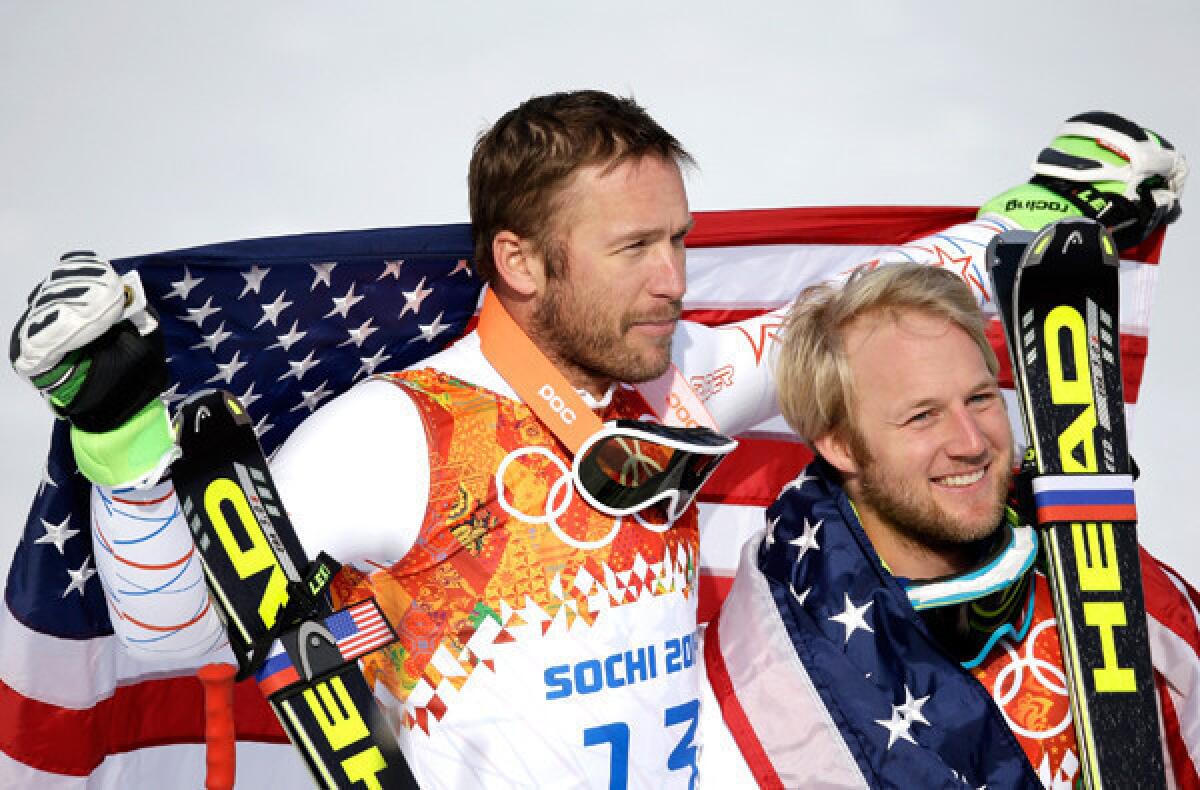U.S. ski team finishes well after sluggish start at Sochi Olympics

- Share via
SOCHI, Russia -- U.S. media members covering Alpine skiing were in attack mode through five Olympic races.
The United States had one medal, Julia Mancuso’s unexpected bronze in the women’s super combined, headed into the men’s super-giant slalom Feb. 16.
Patrick Riml, U.S. alpine director, was called upon to answer for the team’s slow start.
Riml was adamant it was too soon to render a final verdict.
FRAMEWORK: Best images from Sochi
“The Games aren’t over yet, we’re halfway through,” Riml said.
The day after Riml’s halftime speech, Andrew Weibrecht and Bode Miller won silver and bronze in the men’s super-G.
Ted Ligety and Mikaela Shiffrin then followed with gold medals in the men’s and women’s giant slaloms.
Riml is Austrian by birth, but he was as American as Yogi Berra when he basically said: “It isn’t over until it’s over.”
The U.S. ski team went from a near skid-off to leaving Sochi with five medals, three short of the output four years ago in Vancouver, Canada.
And that team had Lindsey Vonn, who won a gold and a bronze.
Nothing is certain in ski racing but Vonn, had she not been injured, would have been a strong medal contender in three events.
Vancouver may have also been an aberration as the U.S. finished with twice as many alpine medals as the Austrians.
“Vancouver was unusual,” Riml said.
The five Sochi medals match the 1984 Sarajevo Games for second-most in U.S. alpine history.
Sochi said goodbye to one American star, Miller, and hello to another, Shiffrin.
Miller is 36 and has likely competed in his last Games, although Riml said “you never know about Bode.” Miller had one of the strangest six-medal careers in Olympic history.
He won two in Salt Lake City in 2002 and then nothing in 2006 in Turin, Italy, competing in five events. He won three in Vancouver.
Miller is the best male skier in U.S. history by a country mile, but he never won the Olympic downhill, his best finish a bronze in Vancouver.
He amassed more alpine medals than any U.S. skier and ranks second behind short-track speedskater Apolo Ohno’s eight in U.S. Winter Olympic history.
Even Miller’s last Olympics were bittersweet. He won a bronze in super-G but finished eighth in the downhill.
Miller finished 20th in the giant slalom, his last race, before bowing out of the slalom.
“It’s tough to have my last race here look like this, but I feel really good about where I’m at,” Miller said. “I came back really strong, did a lot of work and put in the time.”
Miller was already home in the U.S. when Shiffrin, the star of the future, won her gold Friday night.
As the youngest winner of an Olympic slalom, the 18-year-old Shiffrin lighted up the night course and assured the U.S. a medal contender for the next four Olympics.
Shiffrin is a gate specialist now but, like Miller, Vonn and Mancuso, will eventually be stretched into an all-event skier capable of winning World Cup overall titles and the Olympic downhill.
“We’ve got to be patient, we know her potential,” Riml said. “To throw her into speed too soon, too much, is not going to be healthy.”
Shiffrin has such a great future she will probably win medals at Winter Olympics sites that have yet to be awarded.
“Miracles are not random,” she said Saturday. “You control your own destiny. You can make your own journey. I am already dreaming for the next Olympics and winning five gold medals.”
Five?
“She’s on a good track,” Riml said, jokingly.
Ligety, Vonn and Mancuso, who have eight combined medals (four gold), each will be 33 in four years. Vonn has vowed to return from knee surgery to compete in 2018.
Mancuso seemed reinvigorated in Russia after winning her fourth medal and has the knack for stepping up her game in the Olympics.
Ligety, barring injury, should be back to defend his giant slalom gold and also compete for medals in super-G and super combined.
The Olympic course that will be used in South Korea is where Ligety won his first World Cup race in 2006.
The U.S. ski team lacks depth between the veterans and Shiffrin, but has four years to find some.
Four years ago, who knew about Mikaela Shiffrin?
Twitter: @dufresnelatimes
More to Read
Go beyond the scoreboard
Get the latest on L.A.'s teams in the daily Sports Report newsletter.
You may occasionally receive promotional content from the Los Angeles Times.







